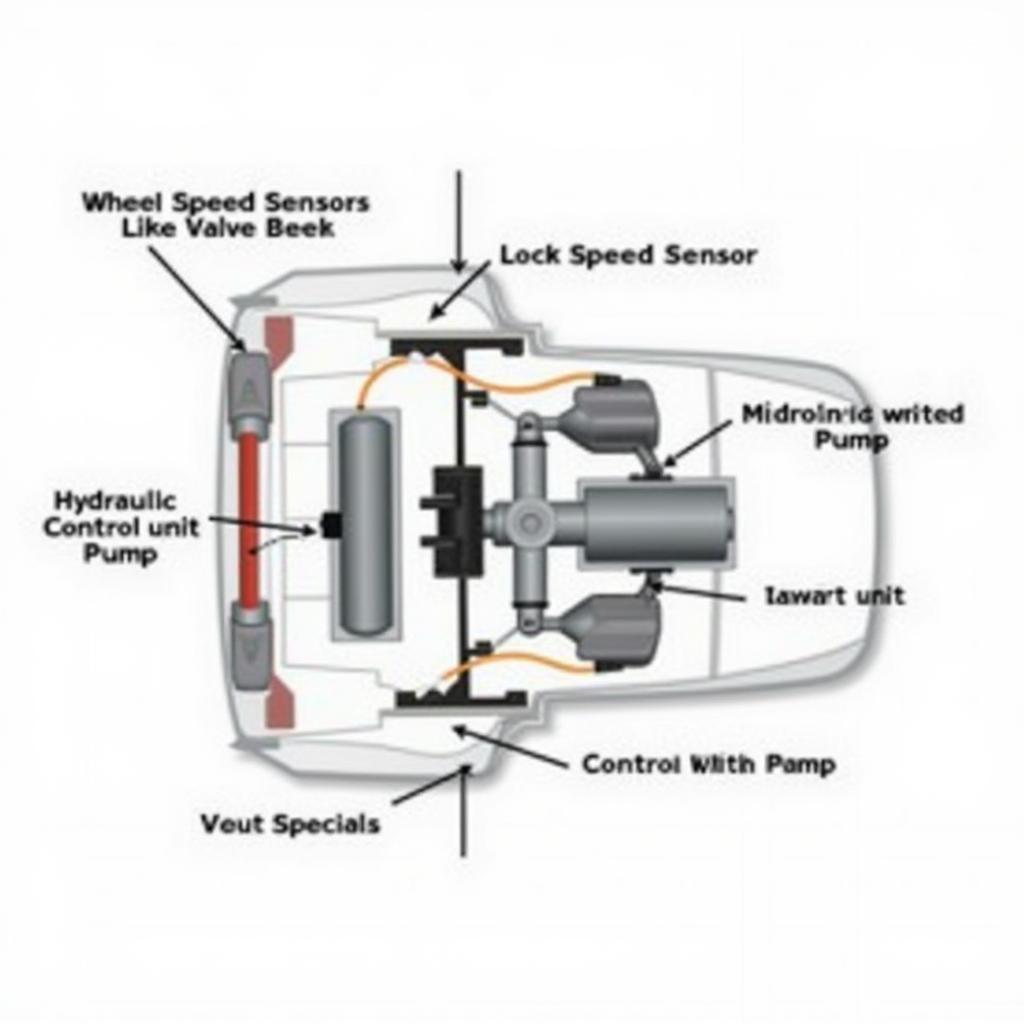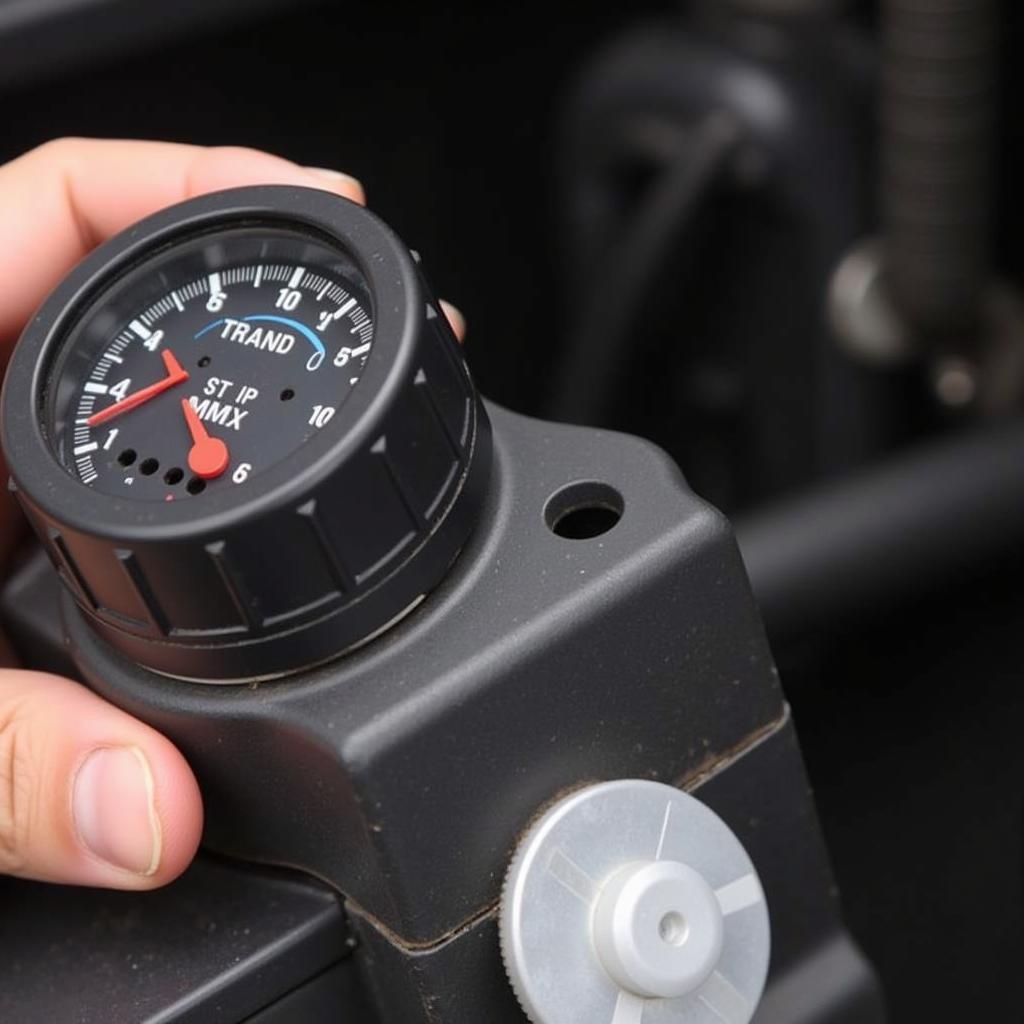The ABS brake warning light, that often dreaded yellow or orange beacon on your dashboard, can be a source of anxiety for any driver. Seeing it illuminated means your Anti-lock Braking System (ABS) has detected a problem and deactivated itself. While this doesn’t mean your entire brake system is compromised, it’s crucial to understand why this warning light is on and address it promptly.
This comprehensive guide delves into the common causes of ABS brake warning light problems, offering insights into potential solutions and empowering you to address this issue effectively.
Understanding Your Car’s ABS System
Before we dive into the causes and solutions, it’s helpful to understand how the ABS in your car actually works. The ABS is a sophisticated safety feature designed to prevent your wheels from locking up during sudden braking. This is particularly crucial in emergency situations or on slippery surfaces where maintaining control of the vehicle is paramount.
 Car ABS System Components
Car ABS System Components
The ABS system uses a network of sensors to constantly monitor the speed of each wheel. If it detects a wheel locking up during braking, it automatically modulates the brake pressure to that specific wheel, preventing a skid and helping you maintain steering control.
Common Causes of ABS Brake Warning Light Problems
Several factors can trigger the ABS brake warning light. Some of the most prevalent causes include:
1. Faulty Wheel Speed Sensors
Wheel speed sensors play a critical role in the ABS system. They are responsible for relaying each wheel’s rotational speed to the ABS control unit. If a sensor becomes dirty, damaged, or fails, it can disrupt the signal and illuminate the ABS warning light.
2. Malfunctioning ABS Control Module
The ABS control module is the brain of your anti-lock braking system. It receives signals from the wheel speed sensors and other components to determine if and when to activate the ABS. Like any electronic component, the control module itself can fail, leading to an illuminated warning light and potential ABS system malfunction.
3. Low Brake Fluid Level
Brake fluid is the lifeblood of your entire braking system, including the ABS. If the fluid level is low, it can impede the hydraulic pressure required to operate the ABS system effectively, triggering the warning light.
 Checking Brake Fluid Level
Checking Brake Fluid Level
4. Issues with the ABS Hydraulic Unit
The ABS hydraulic unit houses valves and pumps responsible for regulating brake pressure during ABS activation. If there’s a problem with this unit, such as a malfunctioning pump or a leak, it can trigger the warning light.
5. Electrical Problems
Like most modern automotive systems, the ABS relies on a network of electrical wiring and connections. Corrosion, loose connections, or damaged wiring can interrupt communication between the ABS components and the control unit, leading to a warning light.
What to Do When Your ABS Light Turns On
Seeing the ABS brake warning light illuminated can be unnerving, but it’s essential to remain calm. Here’s a step-by-step guide on what to do:
- Safety First: If the ABS light comes on while driving, find a safe location to pull over and assess the situation. Avoid sudden braking or maneuvers.
- Check Your Brake Fluid: Carefully inspect the brake fluid level in the reservoir. If it’s low, adding brake fluid might temporarily resolve the issue, but it’s crucial to have the system inspected for leaks or other underlying problems.
- Visual Inspection: Conduct a visual inspection of your brake system, looking for any visible damage, leaks, or loose connections. However, keep in mind that many ABS components require specialized knowledge to diagnose properly.
- Seek Professional Help: In most cases, it’s best to seek professional diagnosis and repair for ABS brake warning light problems. A qualified mechanic can use specialized diagnostic tools to pinpoint the exact cause of the issue and recommend the appropriate course of action.
Remote Diagnostics and Repair: The Future of Automotive Care
As technology evolves, so too do the ways we diagnose and repair vehicles. Remote diagnostics and software installations are increasingly prevalent in the automotive industry, offering convenient and efficient solutions for certain ABS problems.
For instance, if the issue stems from a software glitch within the ABS control module, a qualified technician can potentially resolve it remotely. This involves connecting your car to a specialized diagnostic system via the OBD-II port, allowing the technician to analyze data, troubleshoot software errors, and even install software updates wirelessly.
While not all ABS problems are solvable remotely, this technology highlights the increasing role of software and remote diagnostics in modern car repair.
Conclusion
The ABS brake warning light is a crucial safety indicator in your car. While it can be alarming to see it illuminated, understanding the potential causes and knowing the right steps to take can save you time, money, and potentially prevent accidents. Remember, when it comes to your car’s braking system, err on the side of caution and seek professional assistance for a thorough diagnosis and repair.
Frequently Asked Questions (FAQ)
1. Can I still drive my car with the ABS light on?
While you can technically still drive your car, keep in mind that your ABS system is deactivated, and your brakes may not function optimally in emergency situations. It’s crucial to have the issue diagnosed and repaired as soon as possible.
2. Is it expensive to fix an ABS light problem?
The repair cost varies depending on the underlying cause. A simple fix, like a faulty sensor, can be relatively inexpensive, while a problem with the ABS control module or hydraulic unit can be more costly.
3. How often should I have my ABS system checked?
It’s a good practice to have your entire brake system, including the ABS, inspected annually as part of your routine car maintenance.
4. Can a low battery cause the ABS light to come on?
While uncommon, a severely low battery can sometimes cause temporary electrical glitches that might trigger the ABS light. It’s always a good idea to check your battery health if you’re experiencing multiple warning lights.
5. Does my car insurance cover ABS system repairs?
Insurance coverage for ABS repairs varies depending on your specific policy and the cause of the problem. Check with your insurance provider for details on your coverage.

